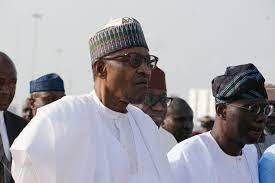ABUJA, Nigeria (AP): Nigerian President Muhammadu Buhari said Thursday that the country’s redesigned currency would bolster the upcoming presidential election, appealing for an end to violent protests over a resulting cash shortage that has led to daylong lines at banks, business closures and people unable to pay for basic needs.
As he came under growing pressure to intervene after days of bank attacks by Nigerians who have failed to withdraw their money, Buhari pointed to the expected gains from swapping out the old naira notes, from curbing surging inflation to reducing the influence of money in the Feb. 25 vote to elect his successor.
“This is a positive departure from the past and represents a bold legacy step by this administration towards laying a strong foundation for free and fair elections,” Buhari said.
Nigerians have been unable to access cash in recent weeks after the country’s central bank started switching out currency notes of higher denominations of 1,000 naira ($2.16), 500 naira ($1.08), 200 naira (43 U.S. cents) with redesigned ones.
Policymakers said the move will help make Africa’s largest economy cashless and more inclusive. But a limited supply of new notes in banks has resulted in pain instead for many who deposited their old currency ahead of a Feb. 10 deadline but are now unable to withdraw cash to use.
The West African country is heavily reliant on cash and only 45% of adults owned a bank account as of 2021, according to the World Bank. The limited supply has forced people to wait in line at banks all day and night to try to withdraw cash only enough to last them a day.
On Wednesday, weeklong protests against the cash shortage crisis further escalated in Nigeria’s southern region where two banks were set ablaze and major roads were blocked, halting commercial activities. In Edo state, police fired tear gas at demonstrators as they attacked bank facilities.
In addition to the pain of continued fuel scarcity in major cities across Nigeria, many businesses also have been forced to close, further squeezing the informal economy — ranging from agriculture to street trade — that is key to economic growth.
Buhari urged against “violence capable of disrupting the electoral processes” in the election that would see Africa’s most populous country elect a new president after his second and final term.
“Unscrupulous officials in the banking industry” sabotaging the court-contested monetary policy by hoarding new currency notes must be prosecuted, said Buhari, who extended the use of the old 200 naira note until April 10. “I am deeply pained and sincerely sympathize with you all over these unintended outcomes.”







